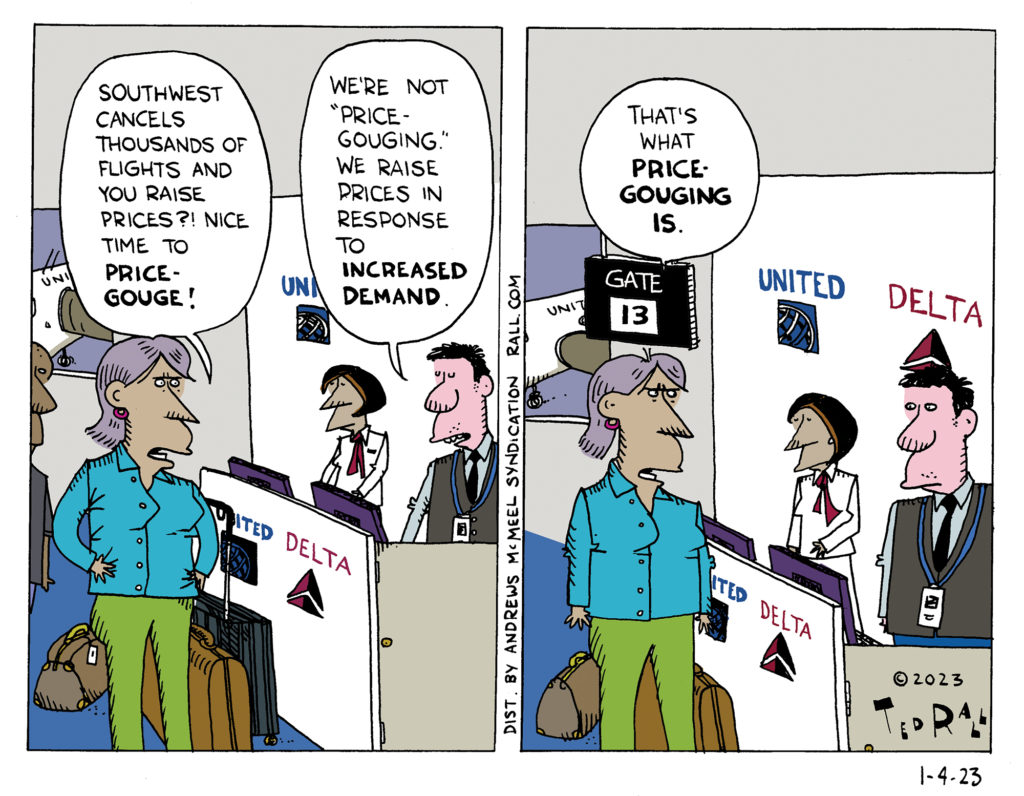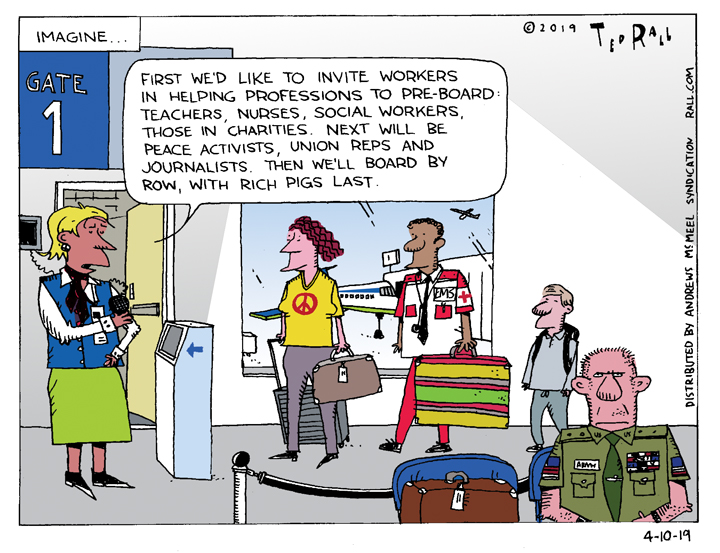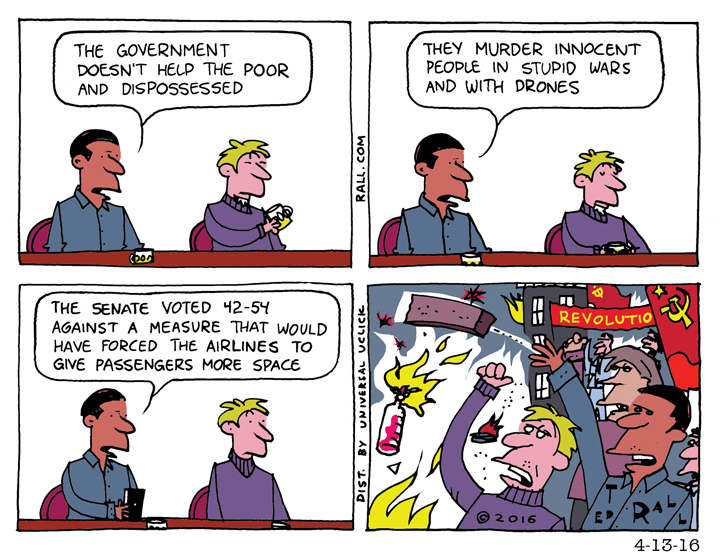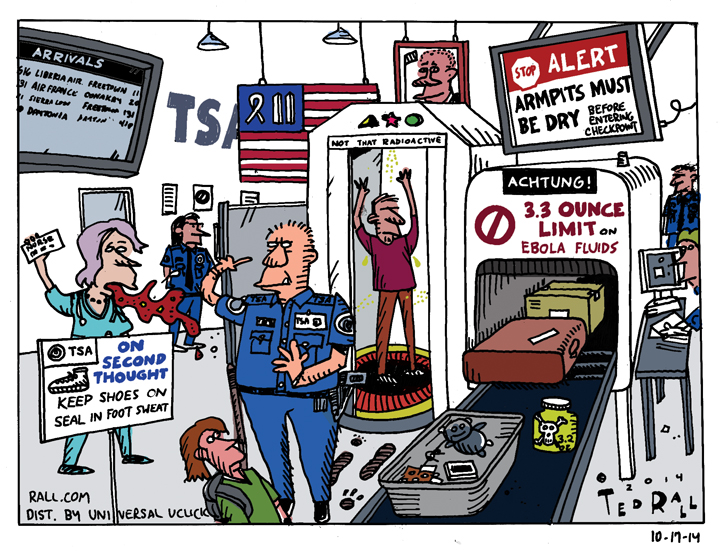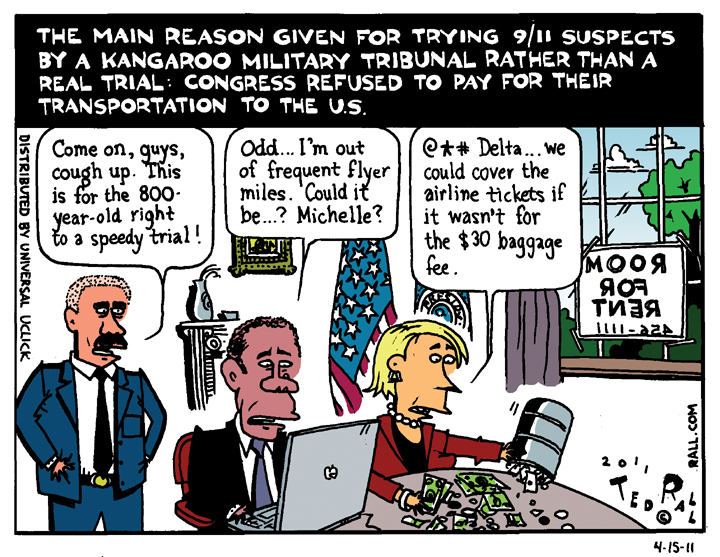A winter storm, labor, shortages, and outdated computer systems caused Southwest Airlines to cancel thousands of flights over the winter holidays. Travelers reported that other airlines, instead of helping out, raised their prices to take advantage of the situation.
We Should Attach Strings to Corporate Bailouts

It’s the end of the world as we know it and the banks and airlines feel fine because even in the midst of economic collapse CEOs can sleep soundly at night, secure in the knowledge that the American taxpayer will bail them out. Again.
All they have to do is wait a respectable 6 to 12 months after the wire transfer clears to start giving themselves raises, renovating executive suites and buying back their stock.
That’s exactly what happened during and after the 2008-09 global economic crisis that followed the subprime mortgage meltdown. In 2008 alone banks that received government bailouts spent $1.6 billion on executive salaries, bonuses and benefits including “cash bonuses, stock options, personal use of company jets and chauffeurs, home security, country club memberships and professional money management,” the AP reported.
It has been a week since securities markets began a terrifying fall. Again, shamelessly, acting under the assumption that we have completely forgotten what they did last time, corporate lobbying groups like Airlines for America are already asking for a $60 billion bailout. Some people in the media are asking the right questions. Steve Inskeep of NPR’s Morning Edition asked an AFA spokesman about the $10 to $15 billion in profits the airlines have been raking in annually. Didn’t they save any of that? According to Bloomberg, the idiots spent 96% of their cash to buy back their stock even as they accumulated a mountain of debt.
As a society, however, Americans ought to be asking a bigger question: are we going to allow ourselves to be conned by these corporate douches the way we have been in the past?
Clearly the United States economy cannot recover from the coronavirus shock without a viable transportation system. That includes airlines. Similarly, we can’t allow banks to fail. But we should not repeat the mistakes of the Bush and Obama administrations, who bailed out Wall Street at the expense of Main Street.
The federal government handed over $7 trillion interest-free, no strings attached, to the big banks in exchange for increasing liquidity in the credit markets—which they never did. It’s still too hard to get a mortgage or other type of loan. After 9/11 the feds gave $15 billion to the airline industry which has since treated American airline passengers like crap.
As with the bank bailout, much of the money was wasted and stolen.
As George W. Bush said, fool me once, shame on, shame on you, fool me, you can’t get fooled again. Or something like that.
I have little expectation that they will do this, but the Trump Administration should target federal assistance toward ordinary citizens who are losing their jobs rather than corporations. Not only is this the right thing to do, you get twice the bang for your buck. If Obama had helped distressed and unemployed people pay their mortgages and rent, it would have kept them in their homes, propped up the underlying mortgages that tanked derivatives and therefore saved the banks indirectly. Reducing the number of evictions would have mitigated the real estate crash caused by the deterioration of vacant houses.
To their credit, White House officials seem to be considering direct payments to prop up the economy during the coronavirus crisis. There’s even talk of a $1000 per person per month guaranteed minimum income reminiscent of Andrew Yang’s proposal. Seems like a lot of money but not when you compare it to the defense budget. Maybe we can take a break from killing Muslims?
But I would be surprised if they did that. The political class is just not that into us.
Trump should offer distressed corporations two options in exchange for being rescued from the financial downturn caused by the coronavirus pandemic.
Option one: nationalization.
If we save your automobile company or your oil company or your airline, we own it. All your stock gets transferred to the property of the U.S. Treasury. If the bailout is partial, we take a proportionate share based on a discounted rate of your devalued stock prices. If you are a competent CEO, you get to stay, but obviously at a greatly reduced salary. Once you start to do better, we deserve your profits.
You’re welcome.
Option two: we get to tell you how to run your company.
I’m picking on banks and airlines because they are particularly mean to their customers but you can extrapolate these principles to other lines of business.
If the U.S. taxpayer saves your bank, the U.S. taxpayer has the right to be treated like a human being when he or she does business with you. That means closing the gap between interest rates. It’s insane that banks pay out 0.5% interest on savings accounts while taking in 25% from credit cards. It’s immoral to charge lower fees to rich people with high bank balances than to poor people with hardly any money. Before we dole out money to these institutions, they must promise in writing to do better.
The list of sins of our widely-despised airlines is endless: seats packed so closely together that they would be difficult to evacuate in case of emergency, high flight change fees and baggage fees that have by themselves poured billions of dollars into airline coffers. As Columbia law professor Tim Wu says, “The change fees don’t just irritate; they are also a drag on the broader economy, making the transport system less flexible and discouraging what would otherwise be efficient changes to travel plans.”
The anti-American caste system—first class, business, coach, basic economy—should be abolished. If your flight gets canceled for a reason other than bad weather, you should be compensated. I’m tired of seeing my flights canceled because there would have been some empty seats. Even in case of bad weather, they should put you up in a decent hotel until it clears.
Big bailouts come with big strings. Not one dime of taxpayer money should ever find its way into executive salaries. And no stock buybacks.
Think I’m being draconian? If so, think of all the times you have asked an institution like a bank or an airline to cut you a break. How many times did they say yes? They had all the power and they used it to crush you. Thanks to the coronavirus the tables are turned. We, the people, have the power over the money that these jerks need to survive.
Let’s leverage the hell out of it.
(Ted Rall (Twitter: @tedrall), the political cartoonist, columnist and graphic novelist, is the author of the biography “Bernie.” You can support Ted’s hard-hitting political cartoons and columns and see his work first by sponsoring his work on Patreon.)
Death to the D.I.Y. Society
I admit it: my bias derived from self-interest. I was a bag boy. But that didn’t make me wrong when I reacted to the news that supermarkets would make customers bag their own groceries. This, I told my friends at the time, is the first brick in a road to perdition.
Since the 1970s corporate efficiency experts have burdened American consumers with a constantly expanding galaxy of tasks that businesses used to perform for them. Craig Lambert calls it “shadow work”—labor imposed on you that you’re not conscious of.
The Do It Yourself (because companies won’t hire workers to do it anymore) movement faced little resistance in a culture that elevates personal responsibility and rugged individualism. Which is how, in less than half a century, we have become accustomed to pumping our own gas and planning our own vacations and scanning our own groceries and running our own cable TV diagnostic tests, forgetting how much easier life was with service station attendants and travel agents and cashiers and technicians who came to your actual house. Not only do we work harder, we earn less due to the disappearance of service personnel jobs from the labor market.
Corporate profits uber alles.
I recently visited a Burger King with touchscreen kiosks where you’re supposed to order your food because God forbid BK should fork out $10 an hour to a human being so you can simply tell him you’d like a #2 combo, size medium, drink is a Coke please. Come the Revolution may the scoundrel who thought of this be deported to an exceptionally unpleasant re-education camp.
Now that they have us doing everything ourselves, companies are making us provide our equipment as well.
On United Airlines from Los Angeles to New York recently, the plane was new—and the infrastructure was retro. In place of the seatback TVs that have long been standard on long-haul flights were plastic clips where you’re supposed to place your tablet or smartphone. You can imagine the discussion at United corporate:
“We’ve already conned the idiots into checking themselves in on their phones. Seat-back televisions cost as much as $10,000 per seat to install and maintain. Passengers have their own devices. Let them watch movies on their own tech!”
Liberal soon-to-be-fired executive: “What about old people who aren’t tech-savvy? Poor people without devices?”
“Screw ‘em. Plus they have to download our app and register to watch movies, so we collect more data!”
Liberal: “Some people might say we’re being mighty cheap for a company that makes $3.2 billion in profits a year.”
“And now it’ll be more billions!”
I have a smartphone. And a tablet. And a laptop. But as long as aviation remains a for-profit business sector (one with atrocious customer service), I don’t see why I should subsidize a CEO’s outrageous paycheck with wear and tear on my personal hardware. It’s only a matter of time before we’ll have to fly the planes ourselves too.
Feeling stressed out? Overworked with a million little annoying things to do? It’s not your imagination. The D.I.Y. society has you performing jobs that older generations had done for them by someone paid to do it—and was better at it, too. Every upward tick of the Dow Jones Industrial Average is fed by the rising stress and anxiety caused by corporations schluffing their work onto us.
I would like to think that the market will self-correct by inspiring a new generation of entrepreneurs to build businesses predicated on old-fashioned standards of service. But there’s no sign of that—not for ordinary people. Only the wealthy command bespoke attention, and only from luxury brands.
It is hard for most Americans to grasp how unpleasant the DIY society has made our lives because few of them travel overseas. If they did, especially to the developing world, they would find overstaffed restaurants and stores. Because labor is cheap in those countries, there is always someone available to wait on you. They can’t afford automation so the human touch dominates. Travel agents, for example—if you’re too young to remember the pleasures of having a professional work out a complicated multi-city itinerary and score you a great hotel deal via a personal relationship, you should try it when you go to the developing world. It’s a wonderful vibe and I miss it terribly stateside.
Our only hope is individual resistance.
It’s already begun. Many shoppers refuse to bag their groceries. Others are boycotting self-scanning checkout lines to save the jobs of flesh-and-blood cashiers. “They’re trying to basically herd everyone in, get everyone used to the self-checkouts to continuously cut down on staff,” a Canadian named Dan Morris explained to the CBC. “Machines don’t pay taxes, they don’t pay into the pension plan.” Only 11% of Canadians use self-checkouts.
On that United flight fewer than a third of passengers watched a movie. Who wants to clutter their device with an app for every airline they fly? I will avoid carriers like United and American that eliminate seatback TVs, favor those like Delta that are not, and so should you.
Any time a company gives you a choice between human and machine, like at BK, choose the person. Pick full-serve over self-serve. Patronize businesses that keep people on the payroll and avoid automated BS.
The DIY society will probably win. But we shouldn’t go out without a fight.
(Ted Rall, the cartoonist, columnist and graphic novelist, is the author of “Francis: The People’s Pope.” You can support Ted’s hard-hitting political cartoons and columns and see his work first by sponsoring his work on Patreon.)
No Country for Old Airline Passengers
The U.S. Senate voted down an amendment that almost every American could have approved of heartily, a Chuck Schumer-sponsored measure that would have allowed the FAA to tell airlines to stop packing passengers into planes like sardines. At a time like this can anyone doubt that this isn’t a democracy?
One Delta Flight That Highlights Why Air Travel Sucks So Bad
Originally published by ANewDomain.net:
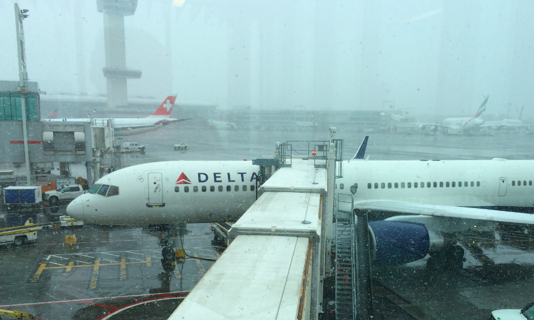 On Friday I traveled from Seattle to New York on Delta. By the standards of American air travel in the year 2015, flight 419 was fine.
On Friday I traveled from Seattle to New York on Delta. By the standards of American air travel in the year 2015, flight 419 was fine.
My seatmates were nice, the woman in front of me didn’t recline her seat until halfway into the flight, the flight attendants were attentive, and we arrived at JFK 45 minutes early – during a snowstorm, no less.
Yet it totally sucked.
The unacceptable state of commercial aviation has become accepted. The insane has been normalized.
It was the best possible terrible experience — one that perfectly exemplified why air travel sucks these days — and everything that’s wrong with the airlines.
Knee Torture
As the guy next to me exclaimed upon sitting down, “They design these seats for midgets!” (It was early, so I didn’t inform him of the more politically correct terms “little people” or “persons of short stature.”) But he’s right: Delta is tied with United Airlines for the dubious distinction of offering the least legroom in coach.
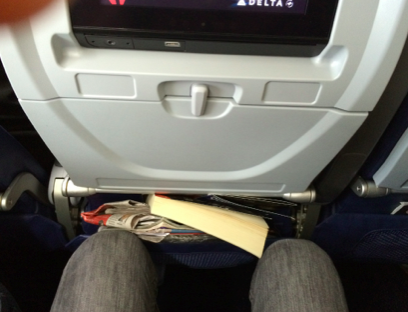
I’m 6’2″. At under 200 pounds, however, I’m a skinny dude. Especially by American standards. I can’t imagine what bigger people do. Or taller ones. Or pregnant ones.
Only the airlines could make me feel sorry for Dick Cheney and Dan Quayle, both of whom have suffered from deep-vein thrombosis associated with flying while stuck in cramped seats. (Don’t those guys get at least business class?)
Check out the photograph above: those are my knees, pressed totally against the seat ahead of me – before the person in front of me opted to recline. (Side rant: reclining should only be enabled on red-eyes.)
You can’t see it here, but my butt is pressed into the corner of my seat; I am sitting straight up. In other words, there is no way to scare an extra millimeter of knee room out of this torture contraption.
I know it could be worse. Someday, probably soon, it will be. A few years ago, you may recall, Ireland-based discount carrier Ryanair flirted with the idea of forcing passengers to stand rather than sit. I also know that the airlines have thin profit margins in a competitive business. However, you’ve got a problem when your customers are driven so crazy that they get into midair brawls over when or if it’s OK to push your seat back.
It’s an even bigger problem when your service is to be endured rather than enjoyed.
Which I might not even have thought about, much less written this piece about, if not for this charming ad on the seat in front of me:
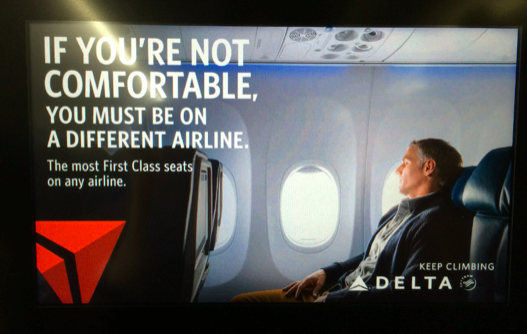
Grim chuckles emanated all around every time this thing cycled through, you know, 14 inches ahead of our faces because – we were definitely not comfortable.
It is hard to overstate how maddening an ad like this is when your knees look and feel like they do in the photo up above. Who’s handling PR for Delta? Howard Schultz of Starbucks? It’s not like we don’t all want to be in first class. It’s not a choice. We’re not riding in coach because we’re cheap.
We’re poor.
Being poor sucks. But you know what’s worse than being poor? Being reminded that other people are rich. Not to mention being told that your poverty is your own damn fault.
Never Saying Sorry
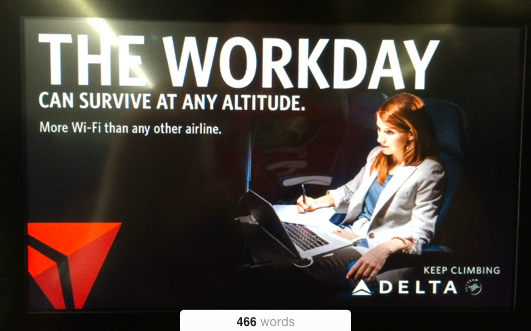 One thing I love about flying is that it can be a great place to get work done, particularly if I get a window seat so no one is trying to get past me to go to the restroom.
One thing I love about flying is that it can be a great place to get work done, particularly if I get a window seat so no one is trying to get past me to go to the restroom.
Unless I can’t.
Friday’s flight would have been a bust the second the woman in front of me reclined her seat into my face; even Houdini couldn’t jam a MacBook Pro between my relatively flat stomach and a reclined seat on Delta. Anyway, it didn’t matter because the Wi-Fi didn’t work.
A five-hour flight is a long time to go without the Internet when you’re a writer, so I’m willing to cough up the outrageously extortionate rate of $33 for GoGo Inflight Internet. Unless, as happened Friday, that wasn’t an option.
As we taxied away from the gate, the pilot helpfully explained that an on-time departure was more important than “the part we would have needed to wait for” in order to get the Wi-Fi working.
Look, I get that stuff happens. Given the fact that it was starting to snow at our destination, I agreed with the pilot’s decision.
What’s annoying is that when the airline inconveniences you – in this case, denying five hours of potential online work time to over 200 passengers – they shrug it off with a glib “oh well.”
When we screw up, we’re expected to pay through the nose. If, for example, you get stuck in traffic and miss your flight, Delta will charge you at least $50 to change your ticket to a later flight the same day. Why can’t I charge them $50 because the Wi-Fi was busted on Friday’s flight? What’s with this unequal relationship?
Foul Food
I never thought I would say this, but I miss the old days of airline food mainly because it was warm.
The war historian John Keegan has remarked that, all things being equal, armies with access to hot food tend to defeat those without it. That’s because the calories and other nutrition inside food is absorbed more effectively when it’s cooked.
I hate the brave new world of airline food, and not only because you have to pay for it à la carte. Morning noon and night, your options are limited to cold lunch: nasty cold cheeses, nasty cold fruits, nasty cold sandwiches. (And Delta’s options are the best of a bad lot.) Give me those old-fashioned mystery – possibly powdered – eggs! Or that plastic tasting ravioli! Just make it warm!
Seasoned travelers like yours truly have learned to work around the dismal state of airline food, or lack thereof, by grabbing a big hot meal on the way to the airport. But there are times, like Friday, when that just isn’t possible.
Think about it, Delta: the flight is at 7 AM. You have to be at the airport at least an hour ahead of time, add a half-hour if you are returning a rental car. At the Seattle Airport, restaurants aren’t open until 6 AM. And the choices are grim.
All I wanted was a light breakfast, maybe a toasted bagel or something ,but that was too much to ask at SeaTac. The guy next to me settled for something called “French Toast Stix.”
Gross.
I would have happily paid $10 or even $15, for some warm powdered eggs.
Bye, Bye, Body Scans: Let’s Get Rid of the TSA
Originally published by ANewDomain.net:
Here’s a modest proposal: get rid of airport security.
I’m serious. Let’s get rid of the whole insane nightmare of TSA checkpoints. No more taking off your shoes and removing your belt, no more possibly carcinogenic and definitely humiliating body scans, no more long lines. Dump the x-ray machines (which also aren’t good for you). Really.
Yeah, yeah, I understand why we have all that crap: 9/11. Also, hijacking planes became so common during the 1970s that “I’m taking this plane to Cuba” became a sitcom joke.
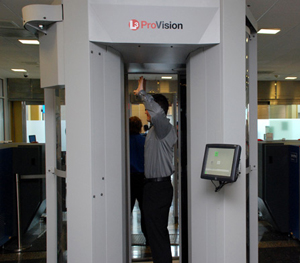 But I’m willing to bet – with my life, and yes, yours, but also those of everyone I love and care about – that eliminating airport security as we know it would be a boon in many ways.
But I’m willing to bet – with my life, and yes, yours, but also those of everyone I love and care about – that eliminating airport security as we know it would be a boon in many ways.
First and foremost, the hassle of flying would be greatly reduced. Shorter travel times would increase the appeal of flying; there are many people like me who drive up to six or eight hours in order to avoid flying in large part because of airline security. Because the roads are more crowded, people are dying.
Reports Bloomberg: “Researchers at Cornell University suggest that people switching from air to road transportation in the aftermath of the 9/11 attacks led to an increase of 242 driving fatalities per month—which means that a lot more people died on the roads as an indirect result of 9/11 than died from being on the planes that terrible day.”
More passengers means more profits for the airlines and more face-to-face business meetings, both of which would be awesome for the economy. The impact could be enormous: during the five years after the 9/11 attacks, passenger volume dropped by 5 percent.
A recent study found that Americans avoided 38 million trips by air in the year 2013 in order to avoid security checkpoint hassles at the airport, costing the U.S. economy at least $35 billion that year alone. Extrapolating over the 14 years since the September 11 attacks, we are looking at a loss of half a trillion dollars in economic activity.
Second, taxpayers would save $7 billion a year by eliminating the TSA. That money could go to any number of better priorities, or it could be used to build more terror drones, or whatever, but still: $7 billion a year. (Obviously, we would need to find jobs for the 55,000 screeners.) That’s a lot of money, and well worth saving.
What would happen terror-wise?
What would happen terrorism-wise? Probably nothing.
Every day, millions of Americans get on subways and buses in American cities without the slightest pretense of a security check. How many of them blow up? Zero. Every day, millions of Americans ride medium-distance commuter trains and buses with similar happy results, despite the fact that they don’t have to go through a scanner first. The same goes for long-distance trains, long-distance buses, ferries and so on. (The TSA has recently begun targeting Amtrak and other forms of ground transportation, but only sporadically and – by all accounts – with no apparent results other than annoying everyone.)
If taking off our shoes is preventing another 9/11, why don’t terrorists target these other forms of transportation? Because they don’t want to, or can’t.
You are at least 2000 times more likely to commit suicide than to get killed by a terrorist.
To clarify: I’m not talking about getting rid of security. I’m talking about getting rid of the airport security checkpoints currently run by the Transportation Security Administration. I would maintain and even beef up security behind the scenes. Every plane should have several armed sky marshals aboard. (That’s not currently the case.) Check-in suitcases and cargo must be carefully tracked and scanned.
And what if someone brings a gun onto your next flight?
What if someone brings a gun on board? I’ve seen it happen. Get this: it was not a problem.
It happened in Afghanistan. Flying out of Kabul airport on a domestic flight a few years ago, I was surprised and amused to see that all of the US supplied x-ray machines were turned off and/or out of order. Passengers filed by; no one was searched. When it was time to board the flight, I observed several people casually stowing weapons, mostly AK-47 rifles, in the overheads. I’m writing this, so obviously nothing bad happened. And this was in an active war zone.
Afghans aren’t crazy or stupid. If a passenger on an Afghan plane tried to use a gun to hijack a plane, he have to contend with a planeload of similarly armed men determined to stop him. Chances of success: slim.
Which is exactly what would happen here. Since 9/11 there have been a number of incidents in which mentally disturbed people raised hell on American planes. Invariably they were overpowered, restrained and turned over to the authorities, usually by a coalition of passengers and crewmen.
That happened on a bus in Seattle recently.
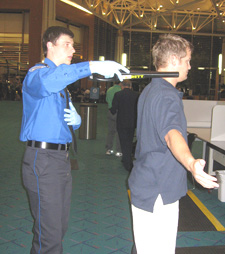 Anyway, it’s not like the current system screens everyone equally.
Anyway, it’s not like the current system screens everyone equally.
Pay $85 and submit to fingerprinting, and you can get out of having to take your laptop out of your bag, keep your shoes on, and your jacket thanks to your membership in the TSA’s PreCheck program. Determined terrorists, especially 9/11-style suicide bombers, aren’t going to be deterred by the application fee or the fingerprint requirement; after all, they know they aren’t going to be prosecuted after the bombing.
Oh, and I bet you probably guessed this one: most airport employees don’t go through any screening whatsoever. “One of the greatest vulnerabilities for this airport and probably any other major airport like MIA is the insider threat,” Lauren Stover, security director for Miami International Airport told CNN a month ago. It’s a story that many people missed at the time, but box cutters were found on several planes grounded after the 9/11 attacks; officials suspected that they were placed on board as part of an “inside job.”
In other words, they are making old ladies take off their shoes while ignoring the real threats.
Besides, whatever power there is in the argument that people who pass the TSA vetting process are less likely to commit terrorist acts is obviated by something that frequent travelers know: at many airports, security staff routinely direct ordinary, non-screened, non-PreCheck members into the PreCheck line. Which exposes the program as a fraud. And yet: there have been no attempts to hijack an American airliner since 2001.
Civil aviation demonstrates the pointlessness of airport security checkpoints. Every day, tens of thousands of airplanes leave and land at airports all over the United States, carrying passengers and cargo that haven’t undergone a screening. Defenders of the current system might argue that the risk from a smaller plane is, well, smaller. But I suspect the real reason has more to do with the fact that the wealthier, whiter pilots and passengers in the civil aviation system are simply more privileged.
Based on fear and paranoia, sucking countless man-hours and dollars out of the US economy every day, airport security in 2015 is like a religious ritual, something we all do even though nobody knows why, and those who do know that there is no reason whatsoever to do it.
Bye bye, TSA!
Grab ‘n’ Feel
The big topic the week seems to be airport security. Millions of white, middle- and upper-middle-class people are now experiencing what until now was experienced by mainly young men of color–arbitrary pat downs and searches.
This is mostly academic to people such as myself. I haven’t had the money to fly since 2006.
But it should be obvious to people what would be most effective in this situation: Boycott the airlines until the nonsense stops. People’s voices and votes may not be worth much these days, but the “dollar votes” are still heard loud and clear by those in power. Vote with your dollars.
But of course, I know you won’t listen. You never do. You’re gonna keep flying, and you’re gonna stand in line at 4am this Friday morning to buy crap shipped in from China.
Get a clue. Please.
Susan out.

